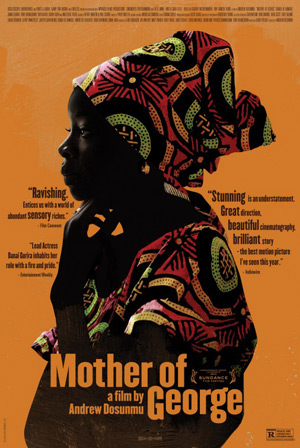On Monday 9/16 the Los Angeles World Affairs Council had a screening of the film Mother of George.
It all starts with a wedding - a beautifully graceful wedding in the traditional Yoruba style of a Nigerian couple who have both found their way to Brooklyn, New York, in search of a better life. The groom, Ayodele, runs a Nigerian restaurant, and his bride, Adenike, has come from Nigeria to get married to him.
The cinematography is luscious - the characters move through a world of saturated colors - yellow curtains, brick walls painted vivid blue or red, and they wear rich printed fabrics of indigo, gold and saffron like exotic butterflies. The director of photography, Bradford Young, pulls the camera in and out of focus on the brightly colored patterns, spinning tales with a change of palette.
But all these bright colors and the vibrant traditional Yoruba culture they flow from only serve to set in relief the somber mood that spreads through the family as Adenike is unable to conceive a child. Her mother-in-law has made it very clear from the day of her wedding that she is expected to bear not just a baby, but a baby boy whom they will name George, in memory of the mother-in-law’s deceased husband. 18 months pass by with no baby – despite visits to practitioners of magic and her mother-in-law’s foul-tasting fertility tea that Adenike has to drink twice daily. Adenike wants to attend a fertility clinic, but her husband Ayodele won’t hear of it. Finally the mother-in-law tells Adenike that there is only one thing left for her to do - sleep with her husband’s younger brother to get herself pregnant. “It is the same blood” she says with utter seriousness and ruthless intent. This sets Adenike on a path that threatens to split the family group apart – even though she is acting out of love for her husband.
There is very little dialogue in the film, which gives it a unique power, as the strong emotions are played across unspeaking faces, bouncing back off the technicolor walls that surround them. At times the film seems too slow, but it builds up to a dramatic ending where we don’t know if everything is won or everything is lost until the last moment.
Director Andrew Dosunmu has created a film that moves forward like a Greek tragedy, where the characters are pushed and pulled by cultural and family imperatives they are powerless to resist. But his major achievement is to keep us invested in the lives of the married couple, and the manipulative mother-in-law – with her all-knowing smiles. Their culture may be foreign and exotic, but their hopes and fears are very familiar and understandable, and their humanity shines through in every scene. A beautifully made and engaging film from a culture we see very little of in this country.

